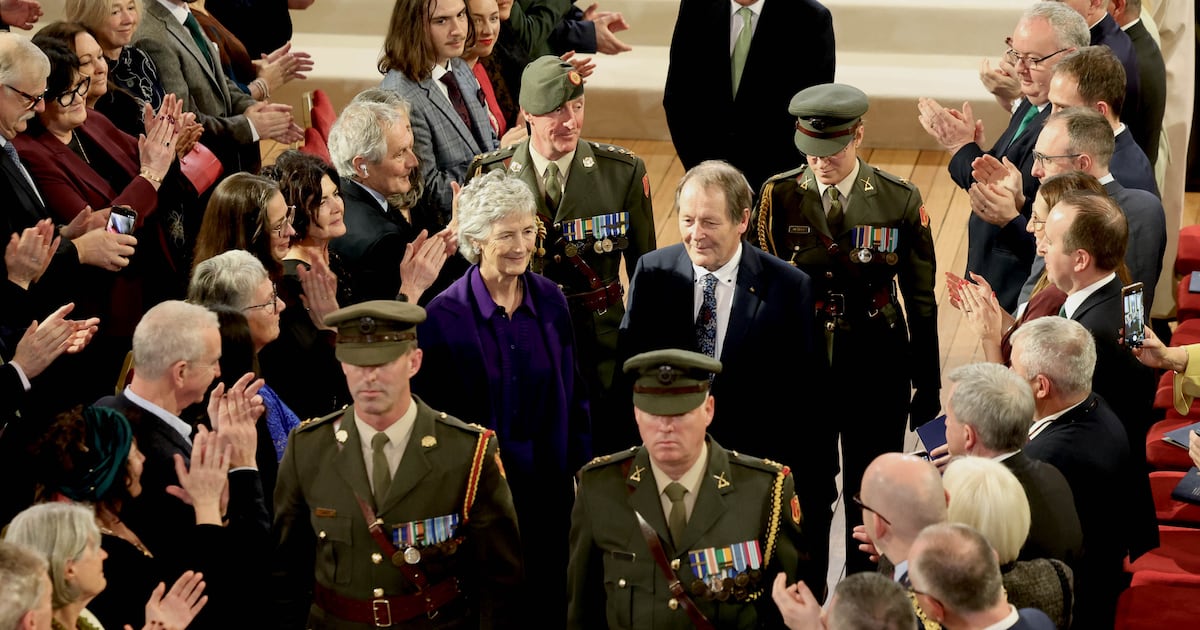Politics
Inauguration of Catherine Connolly Highlights Exclusion of Religions

The inauguration of Catherine Connolly as the 10th President of Ireland has sparked discussions about the inclusiveness of religious representation at state events. During the live coverage on RTÉ, commentators celebrated the ceremony’s religious diversity, noting the presence of officiants from various Christian denominations, as well as representatives from the Jewish and Islamic faiths and the Humanist Association of Ireland. However, this portrayal has been criticized for neglecting significant religious traditions, particularly those of Buddhism and Hinduism.
Despite the inclusion of smaller Christian denominations, the ceremony notably excluded both the larger Buddhist and Hindu communities. In Ireland, there are approximately 33,000 Hindus and 10,000 Buddhists, yet their absence at such a prominent event raises questions about the representation of diverse faiths within the state. While the 1,500 Quakers and 2,700 Jews were afforded a place in the inauguration, the larger numbers of Hindus and Buddhists were overlooked, highlighting a perceived bias towards Abrahamic religions.
Critics argue that this oversight reflects a broader trend within Irish society, where the realities of religion are often ignored. The ongoing dominance of Christian traditions in public life is evident through various aspects, from the Dáil prayer to the prevalence of religious influences in primary education and healthcare chaplaincy. The inauguration ceremony, therefore, is seen as a reaffirmation of traditional Christian values rather than a genuine reflection of Ireland’s multicultural landscape.
The event’s structure and messaging suggested an emphasis on Christian unity, with representatives from various denominations coming together to symbolize a collective identity. Yet, this portrayal has been described as fundamentally flawed, as it excludes a significant portion of the population that does not identify with Abrahamic faiths. According to Zen Buddhist priest Rev Myozan Ian Kilroy, the ceremony’s lack of inclusivity does not resonate with the values of a modern, secular republic.
While past presidents, such as Michael D. Higgins, have recognized the importance of including humanist perspectives, the current inauguration fell short of addressing the growing secular nature of Irish society. The invocation of a deity at the start and end of the ceremony raised further concerns about the state’s commitment to secularism.
The criticism extends to the overall messaging of the inauguration, which many believe failed to embody the core values of a republic. The awkward choreography of the event suggested an attempt at inclusion, yet it did not align with the realities of contemporary Irish life. The National Day of Commemoration, which includes a broader array of faith traditions, is often cited as a more genuine representation of inclusivity.
As Ireland continues to evolve into a more diverse society, the question remains whether the new President’s Council of State will embody the inclusivity that many hope for. The inauguration of Catherine Connolly has undoubtedly opened a dialogue about the need for a more representative approach to religious inclusion in state functions.
-

 Top Stories3 months ago
Top Stories3 months agoTributes Surge for 9-Year-Old Leon Briody After Cancer Battle
-

 Entertainment4 months ago
Entertainment4 months agoAimee Osbourne Joins Family for Emotional Tribute to Ozzy
-

 Politics4 months ago
Politics4 months agoDanny Healy-Rae Considers Complaint After Altercation with Garda
-

 Top Stories4 months ago
Top Stories4 months agoIreland Enjoys Summer Heat as Hurricane Erin Approaches Atlantic
-

 World5 months ago
World5 months agoHawaii Commemorates 80 Years Since Hiroshima Bombing with Ceremony
-

 Top Stories3 months ago
Top Stories3 months agoNewcastle West Woman Patricia Foley Found Safe After Urgent Search
-

 Top Stories5 months ago
Top Stories5 months agoFianna Fáil TDs Urgently Consider Maire Geoghegan-Quinn for Presidency
-

 World5 months ago
World5 months agoCouple Convicted of Murdering Two-Year-Old Grandson in Wales
-

 World5 months ago
World5 months agoGaza Aid Distribution Tragedy: 20 Killed Amid Ongoing Violence
-

 World5 months ago
World5 months agoAristocrat Constance Marten and Partner Convicted of Infant Murder
-

 Top Stories4 months ago
Top Stories4 months agoClimbing Errigal: A Must-Do Summer Adventure in Donegal
-

 Top Stories4 months ago
Top Stories4 months agoHike Donegal’s Errigal Mountain NOW for Unforgettable Summer Views









